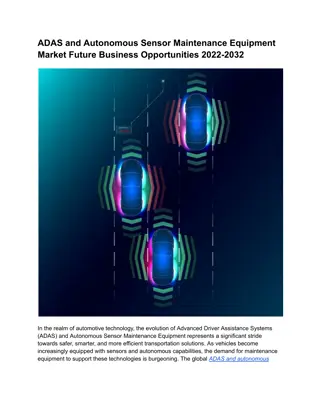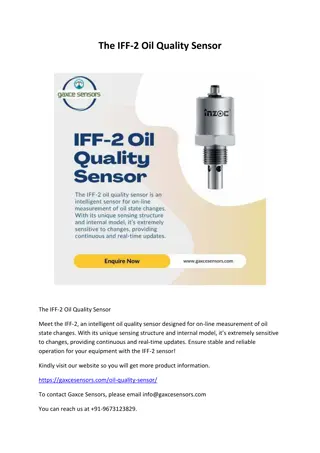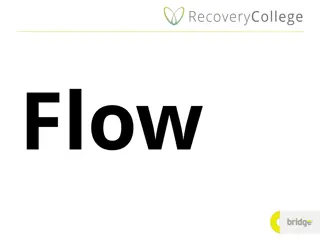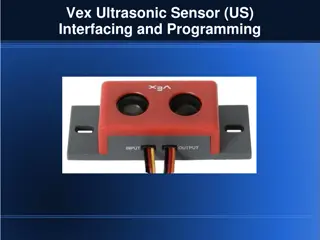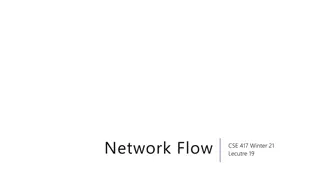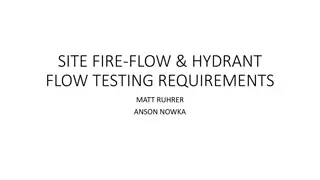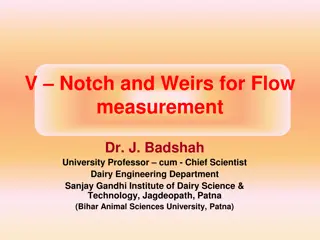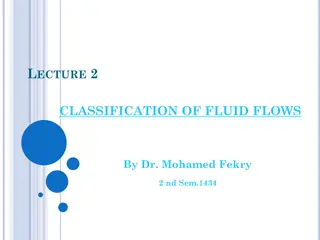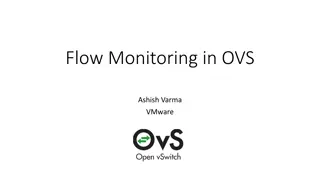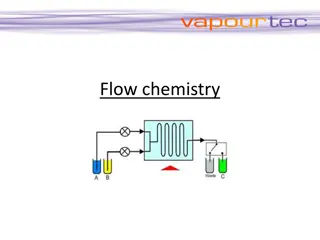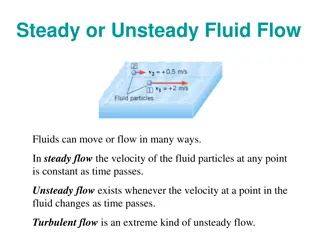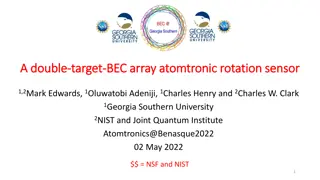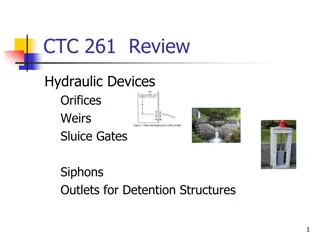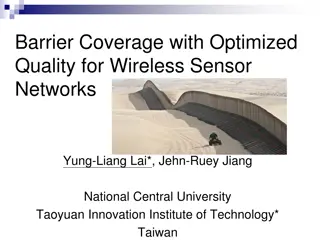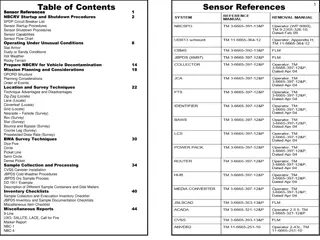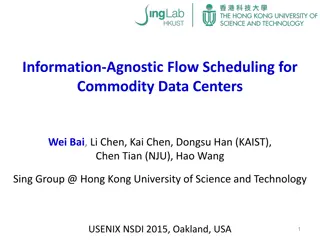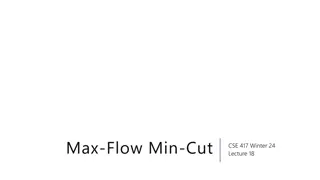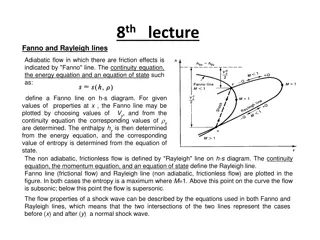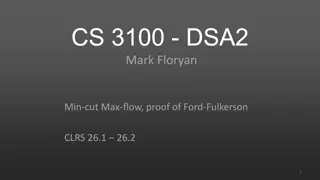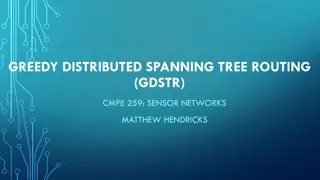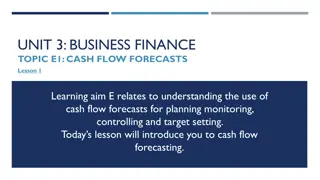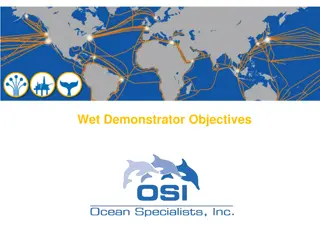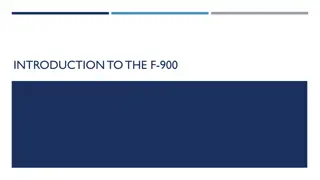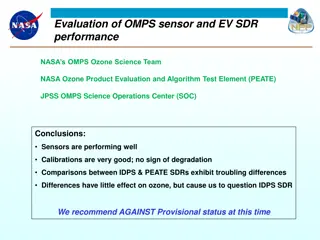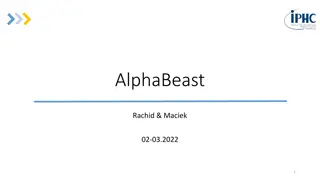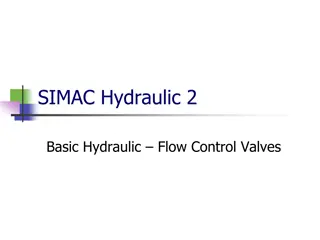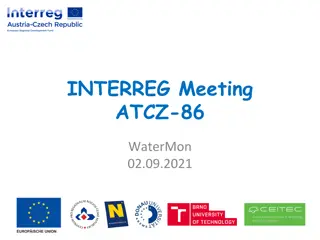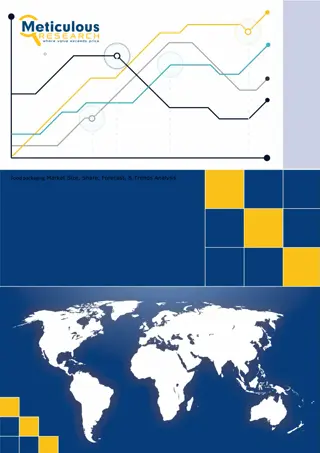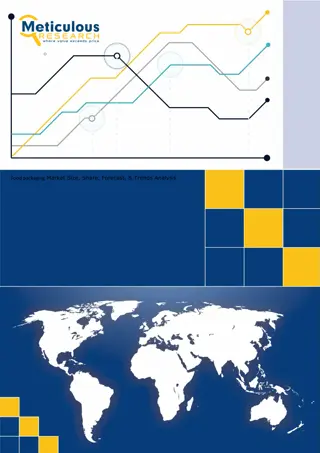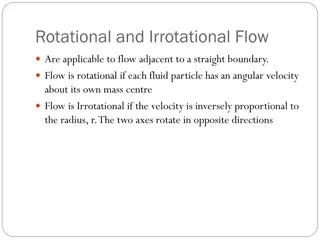Understanding Remote Sensing Sensor Resolutions & Colour Composite
Explore the art and science of remote sensing, detailing sensor types, resolution categories, and color composite techniques. Learn about the stages involved in remote sensing, sensor variations, and band designations for satellites like Landsat 8. Discover the significance of pixel, high-resolution
3 views • 13 slides
ADAS and Autonomous Sensor Maintenance Equipment Market Opportunities 2022-2032
The global ADAS and autonomous sensor maintenance equipment market was valued at $2,704.7 thousand in 2022, and it is expected to grow at a CAGR of 49.68% and reach $1,52,666.5 thousand by 2032.\nRead Report Overview: \/\/bisresearch.com\/industry-report\/adas-autonomous-sensor-maintenance-equipment
4 views • 3 slides
How To Use Wired Motion Sensor Closet Light
Motion sensor lights provide the convenience of constant, powerful illumination without the need to manually turn them on or off. Additionally, it saves time while looking for switches in places with low lighting that you could miss at first. Compared to traditional lighting solutions, motion sensor
1 views • 1 slides
The IFF-2 Oil Quality Sensor
\nThe IFF-2 Oil Quality Sensor \nMeet the IFF-2, an intelligent oil quality sensor designed for on-line measurement of oil state changes. With its unique sensing structure and internal model, it\u2019s extremely sensitive to changes, providing continuous and real-time updates. Ensure stable and reli
1 views • 2 slides
The Psychology of Flow: Achieving Total Focus and Optimal Performance
Engage in activities for their intrinsic value, where the ego diminishes, and time seems to vanish - that's when flow occurs. This optimal psychological state involves deep concentration, clear goals, and a sense of control. By embracing challenges and staying in the present moment, one can cultivat
0 views • 13 slides
Vex Ultrasonic Sensor Interfacing and Programming Guide
Understand how to interface and program a Vex Ultrasonic Sensor, which utilizes high-frequency sound waves to measure distances. Learn the proper connections to the controller and explore the programming statements for initiating and reading sensor values. Delve into configuring the Cortex Controlle
0 views • 8 slides
Understanding Runoff in Hydrology
Runoff in hydrology refers to surface water flow from precipitation and other sources in drainage basins. It plays a crucial role in stream flow and peak flood formation, influenced by factors like overland flow, interflow, and groundwater flow. This article explores the sources of runoff, including
3 views • 27 slides
Understanding Max Flow in Network Theory
In network theory, understanding the concept of maximum flow is crucial. From finding paths to pushing flow along edges, every step contributes to maximizing the flow from a source to a target in the graph. The process involves determining capacities, creating flows, and calculating the net flow ent
2 views • 41 slides
Fire Flow Requirements and Calculation Methods
Detailed information on site fire flow and hydrant flow testing requirements, how to calculate required fire flow, applicable codes and standards including NFPA and IBC, duration of fire flow, methodologies for fire flow calculation, and ISO methods and formulas.
4 views • 30 slides
Flow Measurement Using V-Notch and Weirs in Engineering
Flow measurement in engineering involves the use of V-notch and weirs, such as rectangular weirs and triangular weirs, to calculate discharge rates and velocity of liquids. A V-notch is a triangular obstruction used for flow measurement, while weirs are larger scale structures for measuring river or
1 views • 7 slides
Importance of Cash Flow Analysis in Financial Management
Cash flow analysis is a crucial financial tool for effective cash management, aiding in evaluating financial policies and positions. It helps in planning, coordinating financial operations, assessing cash needs, and meeting obligations. However, it has limitations as it does not substitute the incom
1 views • 7 slides
Understanding the Importance of Flow Charts in System Processes
Flow charts are valuable tools that visually represent the flow of data and process steps within a system. They help define problems, sequence steps to solve them, and show alternatives if issues arise. By using standard symbols, flow charts facilitate communication between engineers and clients, ai
1 views • 35 slides
Understanding Fluid Flows in Fluid Mechanics
Fluid Mechanics is the study of fluids in motion or at rest, and their interactions with solids or other fluids. Fluid flows are classified based on various characteristics such as viscous versus inviscid regions, internal versus external flow, compressible versus incompressible flow, laminar versus
1 views • 16 slides
Understanding Flow Monitoring in OVS for Efficient Network Management
Learn how Flow Monitoring in Open vSwitch (OVS) allows controllers to track and manage changes to flow tables, enabling efficient network management. Explore topics such as Flow Mod programming, Flow Monitor messages, OVS support, monitoring vs. snoop, and practical examples of flow monitoring in ac
0 views • 9 slides
Understanding Flow Chemistry for Efficient Chemical Reactions
Flow chemistry, also known as continuous flow or plug flow chemistry, revolutionizes chemical reactions by running them in a continuous flow stream. This dynamic process offers efficient manufacturing of chemical products with precise control over critical parameters like stoichiometry, mixing, temp
2 views • 7 slides
Fundamentals of Fluid Flow: Steady, Unsteady, Compressible, Incompressible, Viscous, Nonviscous
Fluid flow characteristics such as steady vs. unsteady, compressible vs. incompressible, and viscous vs. nonviscous play crucial roles in understanding how fluids behave in various scenarios. Steady flow entails constant velocities over time, while unsteady flow involves changing velocities. Liquids
0 views • 11 slides
Atomtronic Rotation Sensor Design Using Double-Target BECs
Quantum sensors play a crucial role in positioning and navigation systems like GPS to overcome signal disruptions. Atomtronic circuits can serve as rotation sensors by utilizing intricate setups with ultracold atoms. This design proposes an innovative atomtronic rotation sensor consisting of a recta
0 views • 20 slides
Understanding Open Channel Flow and Mannings Equation
This review covers hydraulic devices such as orifices, weirs, sluice gates, siphons, and outlets for detention structures. It focuses on open channel flow, including uniform flow and varied flow, and explains how to use Mannings equation for calculations related to water depth, flow area, and veloci
1 views • 43 slides
Optimizing Barrier Coverage Quality in Wireless Sensor Networks
Explore the optimization of barrier coverage quality in wireless sensor networks, focusing on maximizing intruder detection, detection probability, and minimizing data transmission time. The problem is modeled graphically and solved using the Minimum Cost Maximum Flow Algorithm, with a background in
1 views • 37 slides
Understanding Sensor-Based Mobile Web Fingerprinting and Attacks
This content discusses sensor-based mobile web fingerprinting, cross-site input inference attacks, smartphone sensors, motion sensor data collection, and HTML5 DeviceMotionEvent interface. It highlights the potential security risks associated with sensor data access on mobile devices and the need fo
0 views • 30 slides
Sensor References and Procedures for NBCRV Operations
This document provides a detailed guide on sensor references, startup, and shutdown procedures for the Nuclear, Biological, and Chemical Reconnaissance Vehicle (NBCRV). It includes information on various sensors, deployment techniques, operating under different conditions, and mission planning consi
0 views • 25 slides
Information-Agnostic Flow Scheduling: Minimizing FCT in Data Centers
This study explores information-agnostic flow scheduling for commodity data centers to minimize flow completion time (FCT) without prior knowledge of flow size. Existing solutions requiring prior flow size information are deemed infeasible for some applications and challenging to deploy in practice.
1 views • 46 slides
Understanding Max-Flow and Min-Cut Problems in Graph Theory
This collection covers the concepts of max-flow and min-cut in directed graphs, focusing on moving water or data packets from a source to a target vertex within given capacities. It explains flow values, finding optimal solutions, and strategies for maximizing flow networks. The visuals aid in grasp
0 views • 58 slides
Understanding Fanno and Rayleigh Lines in Adiabatic Flow
Fanno and Rayleigh lines on the h-s diagram help in analyzing adiabatic flow with friction effects. The Fanno line represents frictional flow, while the Rayleigh line signifies non-adiabatic, frictionless flow. These lines aid in plotting flow properties and understanding phenomena like shock waves
0 views • 6 slides
Ford-Fulkerson Algorithm for Maximum Flow in Networks
The Ford-Fulkerson algorithm is used to find the maximum flow in a network by iteratively pushing flow along paths and updating residual capacities until no more augmenting paths are found. This algorithm is crucial for solving flow network problems, such as finding min-cuts and max-flow. By modelin
0 views • 26 slides
Understanding Greedy Distributed Spanning Tree Routing in Wireless Sensor Networks
Wireless sensor networks play a critical role in various applications, and the Greedy Distributed Spanning Tree Routing (GDSTR) protocol, developed by Matthew Hendricks, offers an efficient routing approach. This protocol addresses challenges such as scalability, dynamic topologies, and sensor node
0 views • 34 slides
Understanding Cash Flow Forecasts in Business Finance
This lesson introduces cash flow forecasting in business finance, outlining the importance of predicting, monitoring, controlling, and setting targets for cash flow. It covers key terms, purpose of cash flow forecasting, cash inflows and outflows, and the structure of cash flow forecasts. Students w
0 views • 10 slides
Wet Demonstrator Objectives - Sensor-enabled Submarine Telecommunications System
This content discusses the objectives and features of a sensor-enabled submarine cable system, highlighting the capabilities and requirements for incorporating sensors along the cable. It emphasizes the importance of demonstrating the installation and accuracy of sensors in a real-world scenario, en
0 views • 21 slides
AT-2040 Vibration Sensor Test Set Overview
AT-2040 is a portable vibration calibrator with sensor stimulation, built-in features, and advanced algorithms for accurate readings. It can measure sensitivity for various types of sensors without additional equipment, making it versatile and user-friendly. The device comes with specifications incl
0 views • 5 slides
Comprehensive Overview of the F-900 Ethylene Sensor
The F-900 Ethylene Sensor is a compact device designed for high ethylene sensitivity, real-time monitoring, and internal data storage. It aids in research, agricultural practices, and fruit ripening management by accurately measuring ethylene levels. The sensor's theory of operation involves oxidati
0 views • 30 slides
Evaluation of OMPS Sensor and EV SDR Performance by NASA
NASA's OMPS Ozone Science Team conducted an evaluation of the OMPS sensor and EV SDR performance, concluding that the sensors are performing well with good calibrations and no signs of degradation. There were troubling differences between the IDPS and PEATE SDRs, leading to a recommendation against
0 views • 29 slides
Development of Silicon Tracker and Sensor Technology for sPHENIX Detector
Research and development efforts are underway for silicon tracker and sensor technology to enhance the functionality of the sPHENIX detector. The project aims to improve mass resolution, cover specific areas effectively, and optimize sensor configurations. Various sensor concepts are being explored
0 views • 25 slides
Next Version Development for AlphaRad4 Sensor Front-End
In this project, the goal is to create the next version of the AlphaRad4 sensor front-end system by modifying the AlphaRad3 front-end to work with the sensors from AlphaRad4. The project involves various functional and electrical specifications, including gain ranges, comparators, counters, and diff
0 views • 18 slides
Basic Hydraulic Flow Control Valves Overview: Types and Functions
Basic Hydraulic Flow Control Valves play a crucial role in regulating fluid flow in hydraulic systems. This comprehensive guide covers various types of flow control valves such as throttle valves dependent on viscosity, meter-in/meter-out/bypass flow control valves, and more. Learn about their funct
0 views • 15 slides
EarTh.HOrizon Sensor Manufacturing Status Review at University of Colorado Aerospace Engineering Sciences
This comprehensive status review covers various aspects of the EarTh.HOrizon sensor manufacturing project at the University of Colorado Aerospace Engineering Sciences. The status of manufacturing, software development, electrical components, algorithms, mechanical aspects, and budget allocations are
0 views • 64 slides
Water Quality Monitoring Project Meeting Highlights
The INTERREG Meeting ATCZ-86 held on 02.09.2021 showcased project progress reports, discussions on sensor development, webserver deployment, and monitoring station concepts. Activities included multi-sensor systems for water parameter measurement, sensor module evaluations, and development of data h
0 views • 13 slides
Enhancing Autonomous IoT Device Pairing with Different Sensor Types
This research explores enabling autonomous IoT device pairing using various sensor types to streamline communication between smart devices. It addresses the challenges posed by heterogeneous sensor types and the need for efficient, secure, and human-independent pairing solutions. The study focuses o
0 views • 34 slides
mass flow controllers (1)
increasing demand for mass flow controllers in the pharmaceutical and medical devices industries and advancements in sensor technology are expected to generate growth opportunities for the market's stakeholders. However, differential pressure limitations with mass flow controllers are a major challe
0 views • 5 slides
mass flow controllers (1)
The global mass flow controllers market is segmented by product type (thermal mass flow controllers, Coriolis mass flow controllers, differential pressure mass flow controllers), flow rate (low (0-50 slpm), medium (0-300 slpm), high (0-1500 slpm)), e
0 views • 5 slides
Understanding Fluid Flow and Measurement Devices
The concept of rotational and irrotational flow adjacent to a straight boundary, along with the dynamics of fluid flows and laws governing fluid flow like the continuity equation and energy equation, are discussed. Insights into devices for flow measurement such as venturimeter, pitot tube, orifices
0 views • 4 slides

